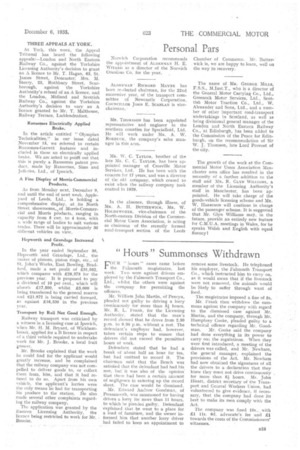Hours" Summonses Withdrawn
Page 37

If you've noticed an error in this article please click here to report it so we can fix it.
FOUR " hours " cases came before the Fahnouth magistrates, last week. Two were against drivers employed by the Falmouth Transport Co., Ltd., whilst the others were against the company for permitting the offences.
Mr. William John Martin, of Penryn, pleaded not guilty to driving a lorry continuously for more than si hours. Mr. R. L. Frank, for the Licensing Authority, stated that the man's record showed that he drove from 2.30 p.m. to 9.30 p.m, without a rest. The defendant's employer had, however, taken certain steps to ensure that drivers did not exceed the permitted hours of work.
Defendant stated that he had a break of about half an hour for tea, but had omitted to record it. The chairman said that the Bench was satisfied that the defendant had had his rest, but' it was also of the opinion' that there had been a certain amount of negligence in entering up the record sheet. The case would be dismissed.
Mr. Edward Andrew Goodman, of .Ponsanooth, was summoned for having driven a lorry for more than 11 hours, to which he pleaded guilty. Defendant explained that he went to a place for a load of furniture, and the owner informed him that another lorry driver had failed to keep an appointment to
remove some livestock. He telephoned his employer, the Falmouth Transport Co„ which instructed him to carry on, as it would mean that if the livestock were not removed, the animals would be likely to suffer through want of food.
".The magistrates imposed a fine of 5s.
Mr. Frank then withdrew the summons against the company with regard to the dismissed case against Mr. Martin, and the company, through Mr. Humphrey Cooke, pleaded guilty to a technical offence regarding Mr. Goodman, Mr. Cooke said the company had done everything in its power to carry out the regulations. When they were first introduced, a meeting of the drivers was called, and Mr. 'Newham, the general manager, explained the provisions of the Act. Mr. Newham had now obtained the signatures of all the drivers to a declaration that they knew they must not drive continuously for more than 5-1,, hours. Mr. John Hieatt, district secretary of the Transport and General Workers Union, had volunteered to give evidence, if necessary, that the company had done its best to make its men comply with the Act.
The company was fined 10s.,with £1 11g. 6d. advocate's fee and Ll towards the costs of the Commissioners' witnesses.




























































































